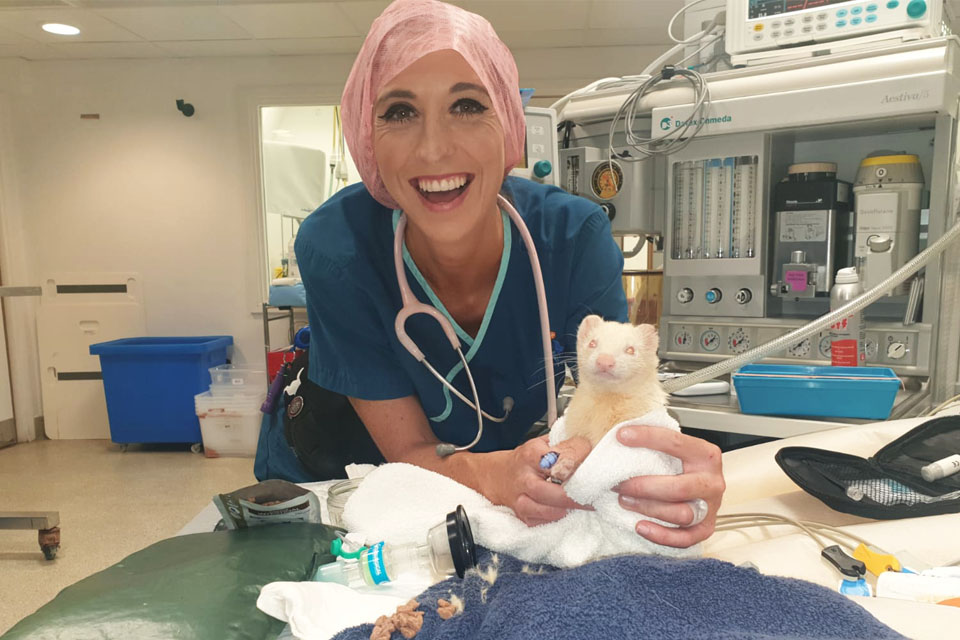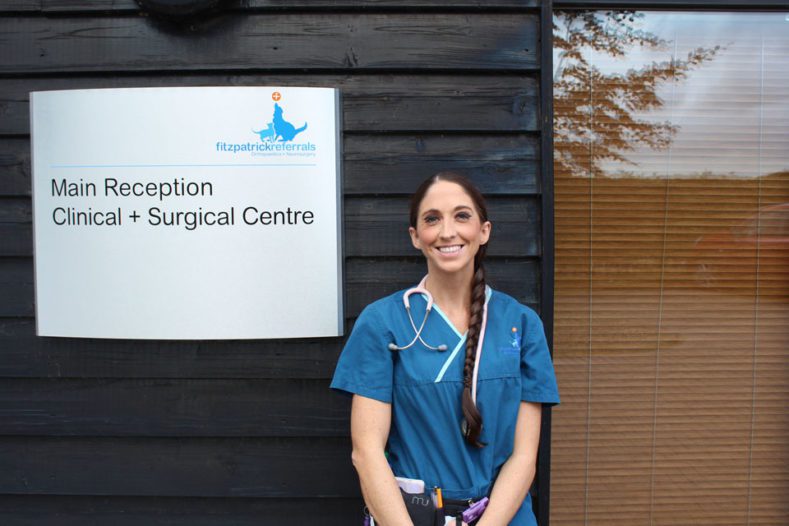
Q & A with Senior Anaesthesia Practitioner Lauren on specialising and postgraduate training for veterinary nurses
The month of May marks Veterinary Nursing Awareness Month across our profession, so we’re delighted to be sharing this Q & A with veterinary nurse Lauren, who is a senior anaesthesia practitioner at Fitzpatrick Referrals Orthopaedics and Neurology in Eashing, Surrey.
How did you get into veterinary nursing?
I started in small animal practice in 2008. I have always had a keen interest in medicine and passion for animal welfare, which helped drive me during my studies to gain the necessary qualifications to enrol on the veterinary nursing course.
What is involved in training to become a veterinary nurse?
There are various routes into veterinary nursing, including apprenticeship lead diplomas and bachelor degrees. Successful completion of veterinary nurse training results in gaining entry to the Royal College of Veterinary Surgeons (RCVS) veterinary nursing register.
Where has veterinary nursing led you since graduation?
I spent some years after graduation working in small animal first opinion practice, honing my newly developed skills and discovering where my areas of interest lay. In 2012, I took the plunge and moved to Australia, taking on the role of head nurse at a busy hospital in Queensland. It was there that I truly started to develop a love for anaesthesia and emergency medicine.
In 2014, I moved back to the United Kingdom to raise my son and joined a busy small animal and equine practice, where I spent the next four years working as a sole charge nurse for the emergency service at night and an anaesthesia nurse in the day. Fast forward to August 2018, I decided to specialise and took an anaesthesia nurse role at Fitzpatrick Referrals, where I was promoted to Senior Anaesthesia Practitioner in November 2019.
What postgraduate training have you undertaken?
There are numerous postgraduate training courses available to veterinary nurses. I am very lucky in that I discovered my passion for anaesthesia very early in my career and my decisions for postgraduate training have been aimed at becoming an anaesthesia specialist nurse.
In 2017, I enrolled on the RCVS Advanced Nursing Diploma, a 2-3-year course that exposes the student to advanced nursing, both practically and theoretically and this qualification helped solidify that I wanted to commit to specialising. I graduated in September 2019. At this point, I firmly had the learning bug and decided to apply to the Academy of Veterinary Technicians in Anaesthesia and Analgesia (AVTAA) to see if I had what it takes to sit the Veterinary Technician Specialist (VTS) examination in anaesthesia and analgesia. The application is an incredibly challenging but rewarding process, requiring demonstration of advanced anaesthesia hours already completed, case reports, an advanced skills list and 60 case logs documenting my ability to anaesthetise various patient categories. You must live and breathe anaesthesia in order to submit a completed application. In April 2020, I was accepted for the 2020 examination in Missouri (USA), this coming September. Watch this space!
What advice do you have for any veterinary nurses thinking of undertaking postgraduate training?
There is a huge variety of courses, certificates and further education available to veterinary nurses. If anyone is interested in further education but is unsure whether they would like to specialise, I would thoroughly recommend enrolling on a multi-module course, or perhaps a short course in a discipline they like, to get a taste of what that specialty has to offer.
Additional training, I feel, helps to empower nurses, open career doors and gives greater job satisfaction when utilising your skillset with patients. Our ultimate goal, is to provide gold standard care to our patients and their families. The only problem with postgraduate training is once you’ve been bitten by the study bug, you are hooked for life!

